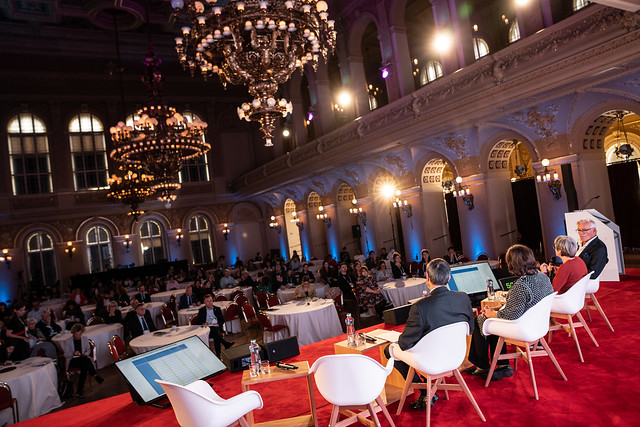European Heritage Policy Agora 2022 – Panel “Beauty and sustainability at the core of Europe’s green transformation”
The European Heritage Policy Agora “For a Value and Culture-Driven Europe”, held on 27 September at the Žofín Palace, was the concluding event of the European Cultural Heritage Summit 2022 in Prague. This inspiring full-day event addressed some of the most pressing challenges facing the heritage ecosystem in Europe, such as the need to mobilise forces and voices in solidarity with Ukraine’s endangered cultural heritage; the role of cultural heritage in fostering peace and solidarity within our societies; and the values of beauty and sustainability for an inclusive green transformation. The Policy Agora benefited from contributions from a wide variety of public and private heritage stakeholders, policy-makers at all levels, young heritage professionals and cultural actors.
The third panel discussion, entitled “Beauty and sustainability at the core of Europe’s green transformation”, focused on the ways in which cultural heritage can and is already contributing to achieving the objectives of the New European Bauhaus initiative, launched by the European Commission’s President Ursula von der Leyen, and the European Green Deal. It built on the key messages of the European Cultural Heritage Green Paper “Putting Europe’s shared heritage at the heart of the European Green Deal”, produced by Europa Nostra in cooperation with ICOMOS and the Climate Heritage Network, with the input of other members of the European Heritage Alliance and the support of the European Investment Bank Institute and the Creative Europe programme of the European Union.
The panel was moderated by Jimmy Jamar, Head of Europa Nostra’s Brussels Office, who stated: “Our values are under attack – yet we shouldn’t forget another major threat: the environmental one, which we need to urgently address”.
To introduce the discussion, Marcos Ros Sempere, Member of the European Parliament (S&D, Spain) and co-rapporteur of the report on the New European Bauhaus initiative, gave an inspirational pitch stressing the key concepts of citizen-led beauty and sustainability. “The New European Bauhaus must improve the lives of citizens, particularly of those who need it the most,” he noted.
Johanna Leissner, Scientific Representative, Fraunhofer-Gesellschaft, presented the key messages of the report “Strengthening cultural heritage resilience for climate change. Where the European Green Deal meets cultural heritage” summarising the work of the EU Open Method of Coordination (OMC) group of Member States’ experts and stressing the pioneering role of Europe in climate heritage adaptation.
🏛️♻️ #EuropeanHeritageSummit – @ICOMOS Europe Vice-President Riin Alatalu stresses the importance of communication & partnerships, as demonstrated by the inspiring #EuropeanHeritageGreenPaper produced in collaboration with @europanostra @ClimateHeritage & @EIBINSTITUTE pic.twitter.com/flRkjwSeta
— Europa Nostra (@europanostra) September 27, 2022
Riin Alatalu, Vice-President of ICOMOS, highlighted the importance of communication and partnerships, as demonstrated by the ground-breaking European Cultural Heritage Green Paper.
Bruno Rossignol, Head of Programme for Climate and Heritage at the European Investment Bank Institute, emphasised: “Cultural heritage contributes to fostering European identity, attractiveness and economic growth. It cannot be seen as an obstacle, but as a vehicle for development”.
At the end of the panel, the participants could watch the video TROBAIRITZ: Natural Stories – the cross-art concerts that have received an EUYO Café Bauhaus Award as an example of the New European Bauhaus initiative. Trobairitz: Natural Stories is a concert series with no carbon footprint where the main programme contains music, poetry, videos – all that are about the subjects of art, humanism, diversity and nature in the city of Paris.
🏛️👫 #EuropeanHeritageSummit – Without young professionals no future for heritage!🔑outcomes of the #TheFutureisHeritage Summit 2022:
✅ Importance of interdisciplinarity
✅ Inter-generational collaboration on equal footing
✅ Include young voices in decision making#EYY2022 pic.twitter.com/fpA4neAQbv— Europa Nostra (@europanostra) September 27, 2022
The last panel discussion was followed by a youth intermezzo, during which six young representatives presented the outcomes of The Future is Heritage Summit, a four-day capacity-building event for young heritage professionals organised on the occasion of the European Cultural Heritage Summit in Prague.
At the end of the Policy Agora, the Prague Manifesto “For a Value-Based and Culture-Driven Europe” was presented, encapsulating the key messages of the Agora and the entire Prague Summit. The Prague Manifesto makes a strong plea to all European leaders as well as all actors of the cultural and heritage worlds at all operational levels to fully recognise the fundamental and irreplaceable role of culture and cultural heritage as a vector to address Europe’s manyfold challenges to build a more sustainable, more inclusive, more peaceful and more beautiful Europe.
In particular, the Prague Manifesto calls to “Integrate cultural heritage as a strategic and crosscutting priority in the Work Plan for Culture 2023-2026 which will be adopted by the EU Council of Ministers during the Czech Presidency of the EU, as well as enhance the role of cultural heritage in the further promotion and implementation of the New European Bauhaus initiative;” and to “Champion, in the context of the UNESCO MONDIACULT Conference held on 28-30 September in Mexico and of the upcoming COP27 to be hosted by Egypt, the key contribution of culture and cultural heritage to help Europe become a green, climate-neutral continent and advocate the need to duly add a dedicated specific Cultural Goal within the UN Sustainable Development Goals (SDGs)”.
All news items about the Policy Agora
Opening session
Panel “Mobilising forces and voices in solidarity with Ukraine’s cultural heritage”
Panel “Cultural heritage as a catalyst for peace and solidarity”
Panel “Beauty and sustainability at the core of Europe’s green transformation”
Youth Intermezzos
Closing session
More information about the Policy Agora
Watch the full videos (part I / part II)
See the photo album
Read the programme booklet







